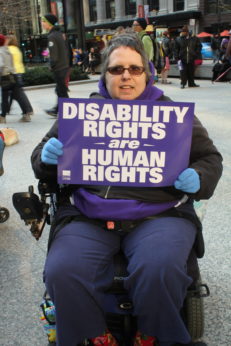
CHICAGO – As part of their ongoing battle for visibility, disability rights advocates here are organizing against policies that they see as existential threats to the affordable housing and healthcare they depend on.
Like the rest of the 20 million people threatened by Trump’s promised repeal of the Affordable Care Act (ACA), those within the disabled community are fearful of losing their insurance. However, their worries go beyond just paying the doctor’s bill. Reliant on components of their health coverage to navigate life and go about their daily tasks, members of the community feel particularly vulnerable.
Though the vote to repeal ACA was called off after Republican leaders and the White House failed to garner sufficient support for their proposed replacement, the fight to defend healthcare is far from over. Last week, ADAPT-Chicago, local affiliate of a national grassroots organization that focuses on disability rights and engages in nonviolent direct action, gathered at Federal Plaza. They were rallying in response to state budget restrictions brought in by Illinois Governor Bruce Rauner that have led to limited funding for disabled populations.
Rauner’s pattern of cuts at the state level is matched with the lackluster job done by the city of Chicago in addressing the developmental and physical needs of members of the disabled community – particularly those with less visible disabilities. Mayor Rahm Emanuel came under fire in 2013 for closing down a number of mental health facilities in an attempt to balance the city budget. All of the shuttered clinics were located in predominantly low-income neighborhoods, many central to the Logan Square area.
Among the featured speakers at the Federal Plaza event were a number of ADAPT members and other disability activists who spoke on a variety of issues faced by the community. Organizers sought to represent a cross-section of the disabled community; Black, Latino and Latina, immigrants, queer siblings, women, and individuals with varying types of disabilities took the stage.
Michelle Garcia, a long-time advocate for undocumented residents, addressed the intersections of undocumented struggles within the disabled community. “The human rights of individuals with disability who are undocumented are undermined and violated,” she said. “They do not get equal access to services like healthcare, housing, employment, and education.”
Jacob Record from the Trans Liberation Collective shared a narrative all too common among members of disabled trans communities, especially those with chronic illness. They highlighted the personal difficulties they had experienced navigating the healthcare system after coming out as transgender. Record also spoke on the importance of “affirming and affordable healthcare services” in a society that stigmatizes both trans and disabled bodies.

Other speakers joined in stressing the importance of intersectional dialogue in the community. Veronica Lozano, an ADAPT member who identifies as a Queer disabled Latina, talked about similarly important facets of identity. “Whenever we have the chance to speak for our community, we have to ask ourselves: who is not at the table?” Lozano reiterated the need to open up dialogue about the experiences that people with disabilities face in medical settings. She discussed the intrusive procedures, violence, and trauma that are enacted upon people with disabilities because they are so often objectified in the medical field.
A study done in March of 2017 by the Ruderman Family Foundation reported high rates of murder and violence committed against people with disabilities (PWD) by those supposedly responsible for their care. “Approximately once a week, a person with a disability is murdered by a family member or caregiver,” according to the report. The data indicated that not only were PWD being murdered at a higher rate and having their deaths masqueraded as “mercy killings,” but that the persons committing such murders received disproportionately shorter jail sentences compared to those whose victims did not have a disability.
For disability rights advocates like Lozano, this situation speaks to the larger issue of how society values disabled bodies. It also perpetuates the idea that a person with a disability does not deserve to live the entirety of their life, simply due to the hardships they may face. “We are seen as an experiment, mere objects that can be told what we need,” Lozano said. “It is very important to find spaces that are able to help us get that story out.”
A start to finding solutions to many of the issues that were addressed at the rally is the development of powerful and effectively organized communities. Disability movements have long worked under the constraints of smaller numbers, as they have suffered erasure in the broader activist movement. Recent administrative policies, however, have allowed them to step out from out of the shadows and fight back. With more battles to tackle, ADAPT and other members of the disabled community continue to push for more accessible housing, healthcare, and means of survival.










